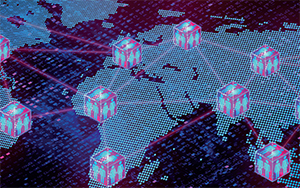 The parallel rise of digital investing and crowdsourcing has fuelled the growth of DAOs – the coming together of a community to raise money for a high-value purchase or investment. But are DAOs really democratising the market or is it a short-term fad?
The parallel rise of digital investing and crowdsourcing has fuelled the growth of DAOs – the coming together of a community to raise money for a high-value purchase or investment. But are DAOs really democratising the market or is it a short-term fad?
Back in 2016, a group of software developers got together and created the DAO – a decentralised autonomous organisation.
The idea was simple: it would provide a kind of venture capital fund in which investors around the world would be able to stake their Ethereum cryptocurrency tokens and then vote on potential investment projects, making collective decisions through an automated system.
The idea quickly caught imaginations and raised a staggering $150m from a crowdfunding campaign.
But then things took a wrong turn. Hackers exploited a vulnerability in the project’s open-source code and siphoned off a third of its funds. Although action was quickly taken to recover most of that money, the DAO itself didn’t recover.
Nevertheless, the idea certainly did, and there’s growing interest in DAOs as a generic concept around the world.
Last year, a group calling itself Constitution DAO came together to buy one of the original copies of the United States Constitution at an auction at Sotheby’s.
The group raised $47m of cryptocurrency in a few days and, although it was pipped to the prize at auction, the group’s ability to raise such funds demonstrates its pulling power.
Meanwhile, PleasrDAO pooled funds to buy the only existing copy of the album Once Upon a Time in Shaolin by the Wu-Tang Clan for $4m, which it added to a portfolio of other rare collectables, including the original Doge NFT (non-fungible token).
The Doge meme depicted a Shiba Inu dog called Kabosu and inspired the cryptocurrency dogecoin – just in case you haven’t been paying attention.
For some, DAOs are a kind of investment club with smart software – known as the smart contract – attached, which is used to govern the way decisions are made.
Members buy their stake with crypto-currency, usually Ethereum, which grants them crypto tokens that enable them to vote, and all decisions and transactions are recorded on the blockchain.
Group thinking
In fact, DAOs are not always about financial investment, points out Rupert Morris, Partner at Guernsey legal firm Walkers. “The key thing is the decentralised nature,” he explains.
“They are founded on democratic principles, which is a kind of mission statement. And they are often started by a small group of people who have a specific project in mind.
“But that could be to help build protocols, to promote a particular title or to create a game. And it effectively creates a mechanism to reward people for their participation.”
One non-financial example is the Water DAO, which is dedicated to bringing clean drinking water to more than 50 million people in the next 10 years.
The HerStory DAO, meanwhile, collects and funds projects by black women and non-binary artists. Another, called the FriendsWithBenefits DAO, is effectively a big social club that throws parties and events.
Much of the interest in DAOs, though, does focus on money-making opportunities of one sort or another.
Earlier this year, one such group, the Terra DAO, partnered with the Washington Nationals baseball team in a five-year $38.1m deal that includes: a sponsorship package; the rebranding of the Nationals Club to Terra Club; a digital series for the club’s social media platforms; and plans to enable the DAO’s proprietary coin, TerraUSD (UST), to be used throughout Nationals Park, home stadium of the Nationals.
Walkers was brought in to advise on the creation of a Guernsey Purpose Trust that could be used to carry out transactions in the real world.
As Morris explains: “A DAO is really a group of people who come together through an agreed set of governance principles, but it doesn’t have a legal personality in its own right.
“Some are centred around an entity such as a foundation company, but others aren’t. In that case, the purpose trust sits alongside the DAO and allows the trustees to execute projects in the real world.”
That could be a question of buying and owning a piece of real estate or some intellectual property, for example.
Guernsey purpose
Tim Clipstone, Funds Partner at Ogier in Guernsey, also sees the Guernsey Purpose Trust as an ideal vehicle to ‘bridge the gap’ between the real and virtual worlds.
“You just need a computer programme, a smart contract, a group of people who sign up to some contractual terms to do something in a certain way, and you can operate really well on that basis,” he says.
“But the problem comes with how you hold assets. A contract is not an entity, it’s simply an agreement to do something.”
 In time, Clipstone believes that ‘legal personality’ may become enshrined in the DAO itself.
In time, Clipstone believes that ‘legal personality’ may become enshrined in the DAO itself.
“There’s clearly a potential there to create a new legal structure, called a DAO, that gives some element of legal personality, such as a structure that enables it to do things in its own name, and hold things in its own name – and, of course, even to be sued in its own name.”
Like most jurisdictions, Guernsey’s Financial Services Commission is looking at virtual assets and how Virtual Asset Service Providers (VASPs) could be licensed and regulated in future, with some expecting a new regime to be in place by the end of the year.
Some have already provided limited recognition to DAOs. In Switzerland, the canton of Zug, for example, has reportedly initiated the use of DAOs for voting on municipal matters.
Meanwhile, Malta has become the first country to legalise DAOs – although critics point out that its legislation places too much responsibility on individual executives, which is incompatible with the spirit of DAOs.
The US state of Wyoming has perhaps gone furthest down this road. It passed legislation allowing DAOs to incorporate in the state and be founded as limited liability companies (LLCs).
This approach is designed to dispel some of the doubts regarding the legal responsibility of DAOs.
Call for transparency
Nevertheless, doubts about DAOs remain. One of the key questions is how they can be compatible with anti-money laundering (AML) legislation, if there is no legal entity and the individuals who are members and owners of the DAO are anonymous.
“That’s exactly what the VASPs regulations will be looking at,” says Clipstone. “The way that you trade virtual assets is different to the way you trade non-virtual assets.
“When you have a devolved ownership structure with no entity controlling ownership – so there’s no board of directors controlling it, and no general partner controlling who the limited partners are – how do you know who actually owns these things?”
A huge amount of transparency will be required to make DAOs acceptable to regulators, he believes.
A separate issue is that of the risk that individual investors take when participating in a DAO. Everyone who does so has to take responsibility for making decisions, as there is no executive to delegate that role to.
As Clipstone puts it: “What you’re doing is taking away the whole agency, the concept of the board of directors and their delegation of obligation. And you’re also taking away the whole fiduciary obligations of the board.”
In some cases, this can go spectacularly wrong. In January, a group called Spice DAO announced that it had paid €2.6m to buy a rare art book by Alexander Jodorowsky called Dune, about his attempts to make a film of the sci-fi classic Dune back in 1974.
The members of the DAO intended to convert the book into NFTs, burn the physical copy, and adapt the story into an animated series. But what they didn’t realise was that they hadn’t bought any copyright, just a single book.
Rupert Morris says it is still early days for DAOs, and although it is hard to see exactly how they will evolve, there is an exciting future ahead as people turn increasingly to digital assets.
“I think there’s a great chance to make Guernsey and Jersey real centres of excellence for this type of work,” says Morris. “One of the great sellers for these islands is the fact that we have a gold-plated regulatory regime.”